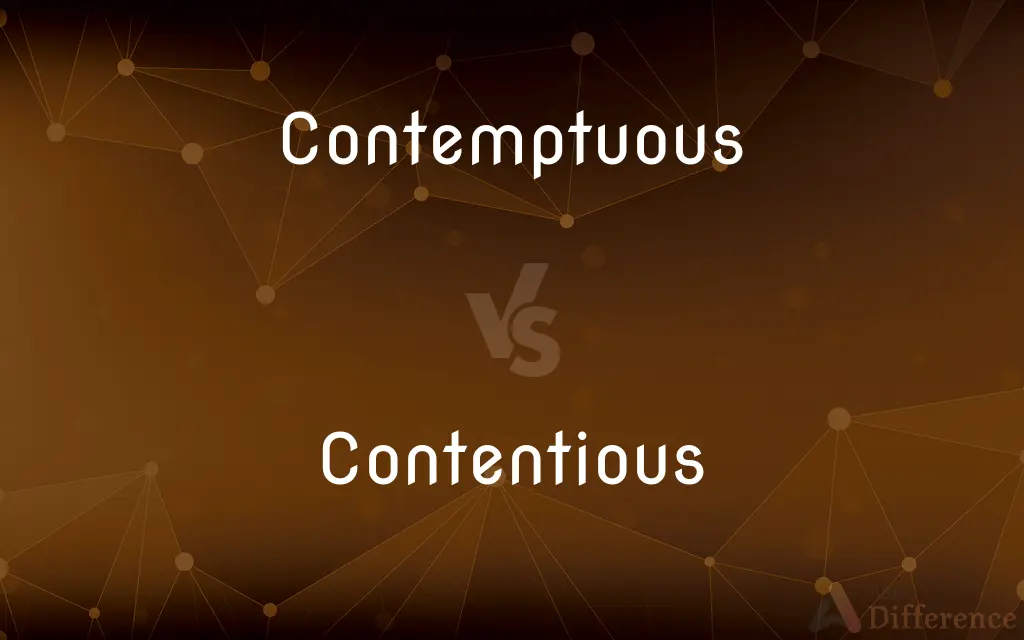Contemptuous vs. Contentious — What's the Difference?
Edited by Tayyaba Rehman — By Urooj Arif — Updated on April 16, 2024
Contemptuous describes disdain or scornful attitudes, while contentious refers to being argumentative or prone to disputes.

Difference Between Contemptuous and Contentious
Table of Contents
ADVERTISEMENT
Key Differences
Contemptuous behavior often involves overt displays of disrespect or derision, indicating a strong disapproval or disdain towards another party. On the other hand, contentious behavior primarily signals a predisposition to arguments or conflicts, often arising from differences in opinion or interests.
People exhibiting contemptuous attitudes generally look down upon others or treat them with scorn. Whereas, those who are contentious might not disrespect others but engage in debates or disputes driven by a competitive or confrontational nature.
In social interactions, a contemptuous person might use dismissive language or nonverbal cues like eye-rolling to express their low regard. Conversely, a contentious individual may focus more on challenging ideas or engaging in lengthy discussions to assert their viewpoints.
Within legal or formal settings, contemptuous remarks can lead to sanctions or legal repercussions if they undermine the respect due to the proceedings or officials. On the other hand, contentious issues in such settings often involve multiple parties actively disputing claims or legal interpretations, which may prolong proceedings but are a normal part of the legal process.
Understanding these behaviors can aid in communication, as recognizing when someone is being contemptuous can signal a deeper animosity, while contentious interactions might simply indicate a robust exchange of ideas or negotiations.
ADVERTISEMENT
Comparison Chart
Definition
Showing disdain or scorn towards someone or something
Inclined to argue or provoke disagreement
Emotional Underpinning
Disrespect, superiority
Competitiveness, confrontational
Typical Contexts
Social interactions, critiques
Debates, negotiations, legal disputes
Consequences
Can lead to social isolation or reputational damage
May result in prolonged disputes or resolutions
Communication Style
Dismissive, derisive
Argumentative, challenging
Compare with Definitions
Contemptuous
Indicative of contempt.
With a contemptuous snort, he dismissed the idea.
Contentious
Controversial, debatable.
The proposal is contentious and has divided the community.
Contemptuous
Showing disdain or disrespect.
His contemptuous glance made her feel unwelcome.
Contentious
Relating to conflict between opposing viewpoints.
He is known for his contentious style in politics.
Contemptuous
Treating something as unworthy.
She was contemptuous of anyone who didn't share her tastes.
Contentious
Prone to disputes and arguments.
She entered the meeting with a contentious issue.
Contemptuous
Expressing superiority over others.
His contemptuous remarks about amateurs irked the audience.
Contentious
Likely to cause an argument.
The contentious debate lasted for hours.
Contemptuous
Characterized by a scornful attitude.
She gave a contemptuous laugh at the proposal.
Contentious
Involving heated disagreements.
The discussion turned contentious when money was mentioned.
Contemptuous
Manifesting or feeling contempt; scornful.
Contentious
Given to contention; quarrelsome.
Contemptuous
Showing contempt; expressing disdain; showing a lack of respect.
I don't know that guy, but he just gave me a contemptuous look.
Contentious
Involving or causing contention; controversial
"a central and contentious element of the book" (Tim W. Ferguson).
Contemptuous
Manifesting or expressing contempt or disdain; scornful; haughty; insolent; disdainful.
A proud, contemptuous behavior.
Savage invective and contemptuous sarcasm.
Rome . . . entertained the most contemptuous opinion of the Jews.
Contentious
Marked by heated arguments or controversy.
Contemptuous
Expressing extreme contempt
Contentious
Given to struggling with others out of jealousy or discord.
Contentious
Fond of contention; given to angry debate; provoking dispute or contention; quarrelsome.
Despotic and contentious temper.
Contentious
Relating to contention or strife; involving or characterized by contention.
More cheerful, though not less contentious, regions.
Contentious
Contested; litigated; litigious; having power to decide controversy.
Contentious
Inclined or showing an inclination to dispute or disagree, even to engage in law suits;
A style described as abrasive and contentious
A disputatious lawyer
A litigious and acrimonious spirit
Contentious
Involving or likely to cause controversy;
A central and contentious element of the book
Contentious
Having or showing a ready disposition to fight;
Bellicose young officers
A combative impulse
A contentious nature
Common Curiosities
What causes someone to behave contemptuously?
Contemptuous behavior is often caused by deep-seated beliefs of superiority or moral disdain towards others or their actions.
Can contentious discussions be beneficial in a workplace?
When managed properly, contentious discussions in the workplace can stimulate critical thinking, innovation, and problem-solving.
How can one respond to contemptuous treatment?
Responding to contemptuous treatment effectively involves maintaining composure, asserting boundaries respectfully, and seeking to understand the underlying issues.
What is an example of a contentious issue in society?
Issues like immigration policy, climate change, and gun control are examples of contentious issues that often lead to polarized debates in society.
Are there cultural differences in what is considered contemptuous?
Yes, cultural norms greatly influence what behaviors are considered contemptuous, as different cultures have varying standards of respect and disrespect.
Is contentious behavior more acceptable in certain professions than others?
Yes, professions that involve debate and advocacy, like law and politics, may view contentious behavior as more acceptable or even necessary.
What are the psychological effects of being frequently contemptuous?
Frequently being contemptuous can lead to social isolation, strained relationships, and a negative reputation, impacting personal and professional life.
How can educators deal with contentious behavior in students?
Educators can handle contentious behavior in students by setting clear behavioral expectations, using conflict resolution strategies, and encouraging respectful dialogue.
What are the long-term effects of consistently displaying contemptuous attitudes?
Long-term effects of consistently displaying contemptuous attitudes can include chronic relationship problems, decreased social support, and potential mental health issues like increased stress or depression.
How does one manage a contentious individual in negotiations?
Managing a contentious individual in negotiations involves staying focused on the objectives, employing active listening, and using conflict resolution techniques to keep discussions productive.
How can companies train employees to handle contentious situations?
Companies can train employees to handle contentious situations by providing conflict resolution training, promoting emotional intelligence, and encouraging open, respectful communication channels.
Can contemptuous behavior affect one’s mental health?
Yes, regularly exhibiting or experiencing contemptuous behavior can affect mental health, leading to increased stress, anxiety, and decreased self-esteem.
How do contemptuous and contentious behaviors influence leadership effectiveness?
Both contemptuous and contentious behaviors can undermine leadership effectiveness if not properly managed, as they can erode trust and hinder team cohesion.
What strategies can be used to reduce contentiousness in a community group?
Strategies to reduce contentiousness in a community group include promoting inclusive dialogue, establishing shared goals, and fostering a culture of respect and understanding.
What are the risks of misinterpreting contentious behavior as contemptuous?
Misinterpreting contentious behavior as contemptuous can escalate conflicts unnecessarily, damage relationships, and prevent effective communication and problem-solving.
Share Your Discovery

Previous Comparison
Skiddish vs. Skittish
Next Comparison
Straightness vs. FlatnessAuthor Spotlight
Written by
Urooj ArifUrooj is a skilled content writer at Ask Difference, known for her exceptional ability to simplify complex topics into engaging and informative content. With a passion for research and a flair for clear, concise writing, she consistently delivers articles that resonate with our diverse audience.
Edited by
Tayyaba RehmanTayyaba Rehman is a distinguished writer, currently serving as a primary contributor to askdifference.com. As a researcher in semantics and etymology, Tayyaba's passion for the complexity of languages and their distinctions has found a perfect home on the platform. Tayyaba delves into the intricacies of language, distinguishing between commonly confused words and phrases, thereby providing clarity for readers worldwide.
















































